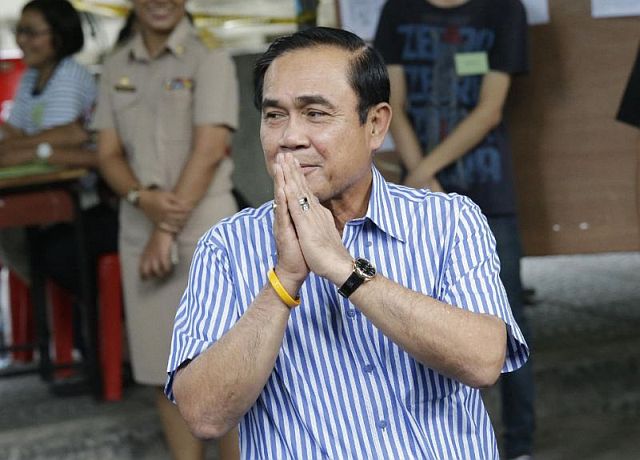
Chan-ocha
BANGKOK — Thais voted Sunday in a referendum on a new constitution that critics say is tailor-made for the military government to stay in control for several years and entrench a new, quasi-democratic system that gives vast powers to appointed officials.
The junta, which came to power in a May 2014 coup and ordered the constitution rewritten, says the new version will usher in a new era of clean politics and stable democracy in a country chronically short of both in recent years. Over the years, Thailand has sometimes slid into violent internal political conflict.
The government of Prime Minister Prayuth Chan-ocha, a retired army general, used its sweeping powers to ban political rallies and independent campaigns against the draft constitution, and allowed virtually no debates on it. Opponents say this was done to ensure that people would have little knowledge about the constitution’s provisions, even though officials say 1 million copies have been distributed in a nation of 64 million people.
More than 100 people who tried to campaign against the referendum on social media have been thrown in jail, and open criticism has been made punishable by up to 10 years in prison.
“If people cannot speak their minds freely or take part in political activities without fear, how can they meaningfully engage in this referendum,” said Josef Benedict, Amnesty International’s deputy director for Southeast Asia and the Pacific.
At a polling booth in Bangkok where Prayuth voted, officials displayed an empty ballot box to reporters and sealed it before letting the first voter — a young woman — enter the booth. She first registered at a desk and signed a paper before casting her ballot.
“Come out (to vote) because today is important for the future of the country. This is your duty and this is part of democracy, of an internationally-recognized process,” Prayuth told reporters after voting.
People are being asked to check “yes” or “no” for the constitution and related provisions on the ballot paper. Final results are expected late Sunday.
The main criticism of the draft constitution includes at least five-year transition to civilian rule and a 250-member appointed Senate that includes the commanders of the army and other security services.